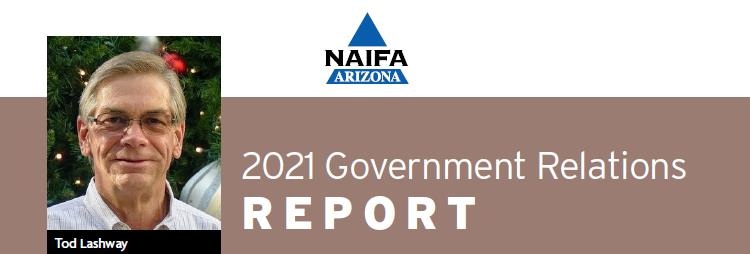
NAIFA Advocacy
https://www.naifa.org/advocacy
GovTalk • GovWatch • GovAlert
https://solutions.naifa.org/govtalk-march-2023
State Legislation
http://www.azleg.state.az.us
Federal Legislation
https://advocacy.naifa.org/center
Arizona House & Senate Contact Information
House Member Roster • Senate Member Roster
NAIFA’s Legislative Action Alert Center
Legislative Action Center
Contact Your Legislator – http://www.naifa.org
Arizona Bill Tracker
https://www.quorum.us/spreadsheet/external/RRlltgaiBmdZRjyWwBQP/

The 2024 General election made for an interesting and hectic year in the Arizona legislature. Republicans managed to maintain slim control of both the Arizona House and Senate.
During the 2024 Arizona legislative session, there were 1,660 bills introduced and 332 of those bills were sent to the Governor for consideration. She signed 259 of the bills into law and vetoed 73. This was a record for the most vetoes by an Arizona governor. There were 70 bills identified as Key Insurance industry related bills. Of those 70 bills 25 of them passed and became effective on September 14, 2024. Governor Hobbs vetoed 4 bills and 41 of the bills Failed to Pass Legislature.
Once again, Arizona, like several other states throughout the country, saw a number of bills introduced this session targeting the policy of environmental, social, and governance (ESG) investing and diversity, equity and inclusion (DEI) investing; however, unlike last session where the Governor vetoed a number of bills, no ESG and DEI bills reached her desk. We anticipate that this topic will continue to be a hot-button issue in Arizona and around the country.
Of significance to all our members, on July 25th the US District Court for the Eastern District of Texas granted a temporary stay of the DOL Fiduciary rule. Then, a day later July 26th in a challenge led by the American Council of Life Insurers along with NAIFA and several other industry groups, Judge Reed O’Connor in the Northern District of Texas agreed and went further by not only halting the effective date for the rule but also halting an amendment to a related prohibited transaction exemption issue along with it. It is anticipated that under the incoming Trump administration that the DOL will not challenge these rulings. These rulings are a resounding win for the industry and a great example of NAIFA and our IFAPAC contributions in action on our behalf.
Some highlights of NAIFA – Arizona activity follow:
- NAIFA Arizona conducted a successful Day on the Hill on February 6th, 2024. We delivered welcome kits to every legislature and visited with as many of our state representatives as were available to meet. Members shared what NAIFA is about and offered to be available for consultations on any insurance related topic or legislation. A huge thank you to Patty Chesebrough for organizing this labor-intensive event. Kudos to our Legislative team and NAIFA members who faithfully support this important annual event.
- We participated in the NAIFA 2025 State Priorities Survey in Sept 2024 which assists NAIFA in keeping in touch with legislative activities that are taking place in each state.
- Your state board is currently in active discussion with Daniel Romm our Arizona Lobbyist representative and are hopeful to retain the services of him and his team. They do an outstanding job of representing your interests and keeping us informed on what is going on in the Legislature.
Thank you to our Legislative team, Phil Solinsky, Dwight Loeffler and Jim Bennett, as well as our State Board and all of the NAIFA volunteers that help to keep NAIFA’s interests top of mind with our legislators.

2022 was a very busy year for the Arizona Legislature. There were 1,851 bills introduced which represented the most pieces of legislation ever introduced in a single session. 392 of those bills were sent to our Governor for consideration. He signed 388 of the bills into law and vetoed 4 bills. This fell short of last year’s record number of bills signed into law by about 50 bills. Some highlights of NAIFA-Arizona activity follows:
- NAIFA-Arizona Lobbyist Agreement renewed. Michael Low and his team do an outstanding job of keeping us informed of what is taking place in the Legislature as well as advising us on best practices for achieving the results desired to protect our clients and our businesses.
- SB 1375 Retirement Savings Program: State Treasurer (Gray): SB 1375 Establishes a 10-member Study Committee on Public-Private Partnerships Retirement Savings Programs to research the operation of a public-private partnership individual retirement program and related regulations and issues. The Committee is required to submit a report of its activities and recommendations to the Legislature by December 31, 2022, and self-repeals January 1, 2024. NAIFA has representation on this 10-member committee.
- Leveraged NAIFA National Government Relations webcasts to stay current on issues that may have potential impact.
- Grassroots meeting with our members and Legislative activity that may impact our membership for the remainder of 2022.
- Attended Post-Election Briefing – Arizona by lobbyist representative, Daniel Romm.
Note! A copy of the 74-page 2022 Legislative Session Summary Report is available to our members upon request.

2021 was a year of change and disruption with a new administration and the continuance of the changing Covid protocol landscape. However, government has worked in a frenzied manner right up to the writing of this report and will continue to year-end. Some highlights of NAIFA-Arizona activity follows:
- NAIFA-Arizona Lobbyist Agreement renewed. Regularly receive(d) and review(ed) industry related legislation – federal and state.
- Arizona Department’s Rulemaking Notice which adopts the latest NAIC revisions to the Annuity Disclosure Model Regulation, including illustrations for participating income annuities
- Arizona Department’s Rulemaking Notice which adopts the latest NAIC revisions to the Annuity Disclosure Model Regulation, including illustrations for participating income annuities
- SB1495 Annuity Contracts; Nonforfeiture Interest Rate (Senator David Livingston) – The bill requires the minimum interest rate for determining an individual deferred annuity nonforfeiture amount from 1% to .15%.
- Leveraged NAIFA National Government Relations informational webcasts to stay briefed on main issues with potential impacts
- Virtual Congressional Conference attended by 12 members
- Arizona sessions with Senators Kelly and Sinema
- Grassroots meetings with our members and their government contacts
- Continued monitoring of Congressional and Legislative activity effecting the membership for remainder of 2021


2018 Government Relations Report
State:
HB 2098 insurance; inducements (Livingston): HB 2098 increased the aggregate value of prizes, goods, wares,
merchandise or tangible property an insurer or agent can provide a customer from twenty-five dollars to one hundred
dollars. Arizona has one of the lowest prohibited inducement restrictions in the country which limits the ability of
insurers and agents to provide promotional items to their customers. Current law allowed consumers to receive
promotional items that have a value of no more than twenty-five dollars. This bill updated the limit on promotional
items to be consistent with surrounding states of Washington, Nevada, Utah and Oklahoma which currently allow for
inducements up to one hundred dollars. Chapter 10, Laws 2018
SB 1295 insurance; producer fees (Livingston): HB 2048 eliminated the prohibition against producers being able to
charge fees in connection with the sale of life, annuity, long-term care and Medicare supplement coverages. Producers
selling such policies would still be required to disclose fees in writing which would need to be agreed to by the insured
and be reasonable for the services performed. Last year, the 53nd Legislature unanimously passed HB 2279 (Chapter
251, Laws 2017). HB 2279 made it clear in statute that insurers have the ability to charge fees associated with an
insurance policy. The bill clarified and tightened the authority and limitations for insurance producers (insurance agents)
to issue fees. However, the legislation did not authorize fees to be charged related to the sale of life, annuity, long-term
care and Medicare supplement coverages. SB 1295. Chapter 255, Laws 2018
HB 2124 life and disability insurance; insolvencies (Livingston): HB 2124 was model language from the National
Association of Insurance Commissioners (NAIC) amending the Life and Disability Guaranty Fund laws. This bill made
various changes to the Arizona life and disability insurance guaranty fund to address any potential insolvencies. Most
notably, the legislation included health care service organizations (HCSOs), also known as HMOs, as “member insurers”
of a life and health insurance guaranty association. Members of an HCSO will be entitled to guaranty fund coverage up
to $300,000 in the event of an insolvency. Under HB 2124, future long-term care insurance related assessments will be
split equally between the life and health insurance industries. The legislation provided a formula that allocates the
assessments between the life insurance and annuity assessment account and the health assessment account. The bill
applied a benefits cap to health benefit plans and asserts benefits provided by a long-term care rider are considered the
same type of benefits as the base life insurance policy to which it relates. The bill included variable rate policies if the
policy provides long-term care insurance benefits. HB 2124 increased the Guaranty Fund Board (Board) membership
from 9 to 11 members. It allowed the Board to reissue policies or contracts of an impaired insurer or an insolvent
insurer. The bill clarified that the Life and Disability Guaranty Fund may, when providing substitute coverage, issue an
alternative policy at actuarially justified rates, with the approval of the Director of the Department of Insurance. The bill
stipulated that if the fund reissues a terminate coverage at a different rate, the rate must be actuarially justified to the
risk. The Board was authorized to file for actuarially justified rate or premium increases for any policy or contract for
which the Fund provides coverage. The Guaranty Fund is authorized issue a substitute coverage for a policy or contract
without the approval of the court presiding over the delinquency proceeding. HB 2124 will take effect on December 31,
2018 and will be applicable to an assessment relating to a long-term care insurer determined to be insolvent after that
date. Chapter 64, Laws 2018
HB 2254 vehicle liability insurance; minimum limits (Carter)/SB 1075 vehicle liability insurance; minimum limits
(Brophy McGee): HB 2254 would have increased the minimum coverage limits for motor vehicle liability policies. For
motor vehicle liability insurance policies that are issued or renewed after July 1, 2019, the minimum amounts of
coverage required are increased from $15,000 to $25,000 for one person sustaining bodily injury or death in an accident.
The limits were also increased from $30,000 to $50,000 for bodily injury or death of two or more persons in any one
accident. Finally, the minimum coverage limits for property damage were increased from $10,000 to $25,000. In
addition to increasing the minimum financial liability limits for private passenger auto insurance, the bill made the policy
declarations page the final expression of a policyholder’s election for both uninsured and underinsured motorist
coverage. HB 2254 specified that the offering of uninsured or underinsured motorist coverage is required to be made at
the time of the application; however, the insurer is not required to reoffer uninsured or underinsured motorist coverage
as a result of a change to the current minimum liability limits. Vetoed
5 Year NAIFA GR Look Back
2013/2014
This was the year we dropped bill HB2353 which made it mandatory that all AZ insurance producers must take continuing education unless grandfathered in. This bill was supported by AZ DOI as they had been receiving increasing pressure from all other states due to our lack of this regulation in place. Other states had an additional burden added in having to research each nonresident from AZ to make sure that they had the necessary CEs for their state. This bill passed and was signed in 2014.
2014-2015
HB2568 insurance premium tax reduction, which decreased the insurance premium tax from 2.0% to 1.7% over a ten year period.
This was a year for regulatory reform dealing with Uber and Lyft. Not a lot that are members would care about.
This year also proved to be an exceptional election year in which NAIFA AZ was very involved in.
2015/2016
HB2002 was an insurance premium reduction bill which would reduce the tax added to insurance premiums from a 10-year reduction to a 6-year phase-out period, rates stayed the same as in 2015. This bill had been in play for many years and passed in 2016.
HB2279 Uninsured/Underinsured motorist. This bill passed and was signed in 2016 SB1441 dealt with the current laws regarding long-term care. Over the years the language had been changed by AZ DOI which clouded the dos and don’ts in the long-term care insurance world. Due to the vast premium increases in the LTC policy world, we were for this bill which would revert the regulations back to the original NAIC approved the language. This bill past and was signed in 2016.
2016/2017
HB2160 was a bill dealing with annuity training. The industry has been moving toward a direction of unity in dealing with annuity training. The NAIC approved language as to the parameters of this training and NAIFA unequivocally agreed that producers selling annuities should be trained in this product. This bill passed and was signed in 2017.
HB2279 was an interesting bill. On the onset, it is a bill that deals with the prohibition of fees being charged by life and health producers. It was to clarify who was NOT allowed to charge fees. The bill inserted “The DOI is authorized to order an insurance producer to refund all or part of a fee or service charge that the DOI determines failed to comply with the requirements. Insurance producers are prohibited from charging or receiving any fee or service charge in connection with the transaction of life, annuity, long-term care or Medicare supplement insurance.” We purposefully left out health insurance producers. With the onset of the ACA, health insurance agents are no longer receiving commissions for advice. The current law does not allow them to charge fees for advice. This bill was an effort to deal with this issue. Please note: the full bill does explain the guidelines for those fees. This bill did pass and was signed in 2017.
2017/2018
HB2048 (now added as a striker to SB2195) is the bill to watch this year. This is a clarification of HB2279 passed in 2017. AZ DOI needed clarification. In addition, due to the DOL regulations, more and more broker-dealers are pushing representatives to go fee-based. AZ current law would not allow for fees to be charged which creates an issue with products such as variable annuities, etc. This bill will allow for producers to charge fees by submitting the proper documentation to AZ DOI. This bill was in a “political quagmire” if you will with two legislators holding each other’s’ bills “ransom”. Due to this issue, we found a workaround by adding HB2048 language to SB2195 which has passed the Senate and was transferred to the house on 2/26. Both appropriations and rules committees have passed this bill and we anticipate the house to pass the bill.
HB2098 Raised the inducement limits to coincide with the FINRA/SEC rules of $100 gifting to clients. The current amount was $25 which, as you know, would limit the flowers you would send to a client to one daisy wrapped in newspaper (ok maybe that is pushing the point ). This bill HAS PASSED and HAS BEEN SIGNED!
HB2124 dealt with the guaranty fund. Given the issues with the LTC insolvencies, NAIC adopted amendments for a 50/50 life and health insurers split. This would help further protect our clients in regards to LTC products. This bill has PASSED and HAS BEEN SIGNED!!
